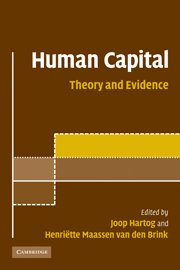Book contents
- Frontmatter
- Contents
- List of figures
- List of tables
- Notes on contributors
- Prologue
- Part I Measuring the benefits from human capital
- 1 What should you know about the private returns to education?
- 2 The social returns to education
- 3 Returns to training
- 4 Human capital and entrepreneurs
- 5 The effects of education on health
- 6 Are successful parents the secret to success?
- Part II Applying and extending the human capital model
- Part III Policy interventions
- Epilogue: some reflections on educational policies
- A note on econometrics
- Index
- References
4 - Human capital and entrepreneurs
Published online by Cambridge University Press: 22 September 2009
- Frontmatter
- Contents
- List of figures
- List of tables
- Notes on contributors
- Prologue
- Part I Measuring the benefits from human capital
- 1 What should you know about the private returns to education?
- 2 The social returns to education
- 3 Returns to training
- 4 Human capital and entrepreneurs
- 5 The effects of education on health
- 6 Are successful parents the secret to success?
- Part II Applying and extending the human capital model
- Part III Policy interventions
- Epilogue: some reflections on educational policies
- A note on econometrics
- Index
- References
Summary
Introduction
In this chapter, we study the effects of human capital investments for the 10% of the labour force that is often neglected in such studies, i.e. for entrepreneurs. Entrepreneurs are defined as individuals who are self-employed, who have started their own business or who run and own an incorporated business. Policy-makers and academic researchers are increasingly aware of the importance of entrepreneurship in our society. Entrepreneurs are often seen as the engine of the economy, responsible for sustained levels of competition, the creation of jobs, and new innovative processes and products, thereby displacing ageing incumbents in a process of ‘creative destruction’. These benefits, which accrue to society at large, justify public expenditure to develop and stimulate entrepreneurship. But it is also recognized that if entrepreneurs face constraints such as limited human capital, then these economic benefits might not be realized. This realization has prompted several governments to devise public programmes to encourage entrepreneurship. Underlying most of these programmes is a belief that human capital in general affects entrepreneurs’ performance in practice. The measurement of the return to human capital for entrepreneurs is thus relevant for devising programmes to realize optimal economic benefits from entrepreneurship.
This chapter gives an overview of past and current empirical research measuring the effect of formal education, one of the most prominent manifestations of human capital, on an entrepreneur's performance. We measure education in terms of years of schooling and the entrepreneur's performance in terms of the individual income level.
- Type
- Chapter
- Information
- Human CapitalAdvances in Theory and Evidence, pp. 52 - 64Publisher: Cambridge University PressPrint publication year: 2007
References
- 1
- Cited by



